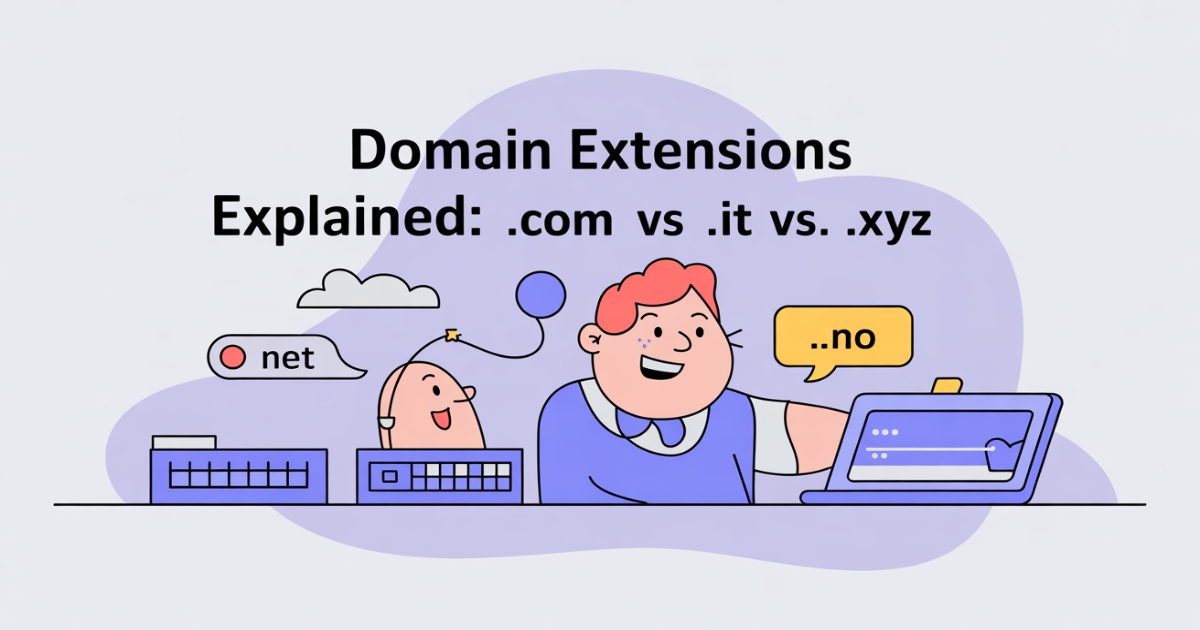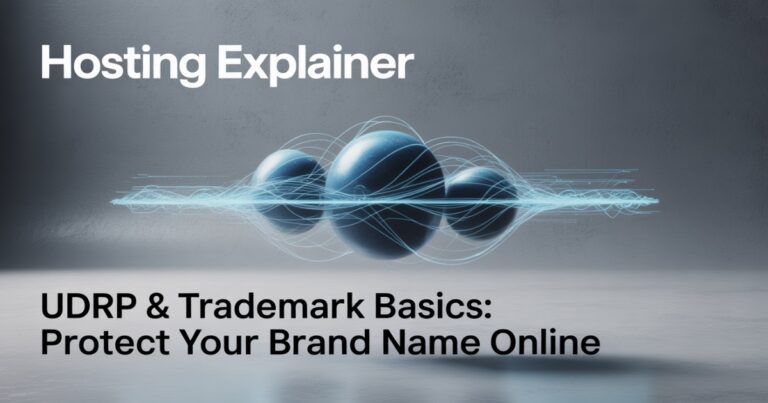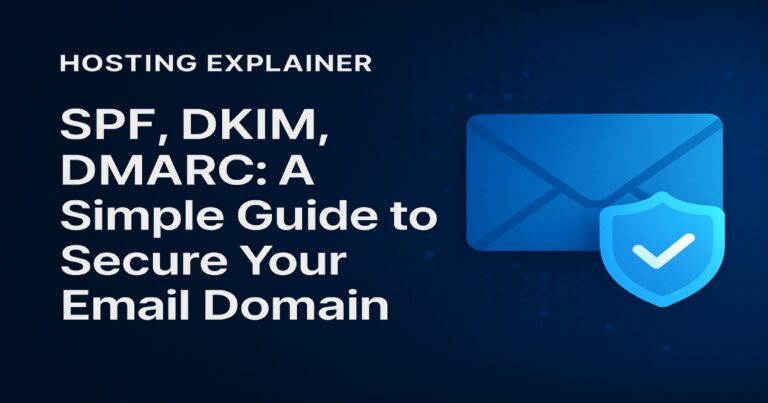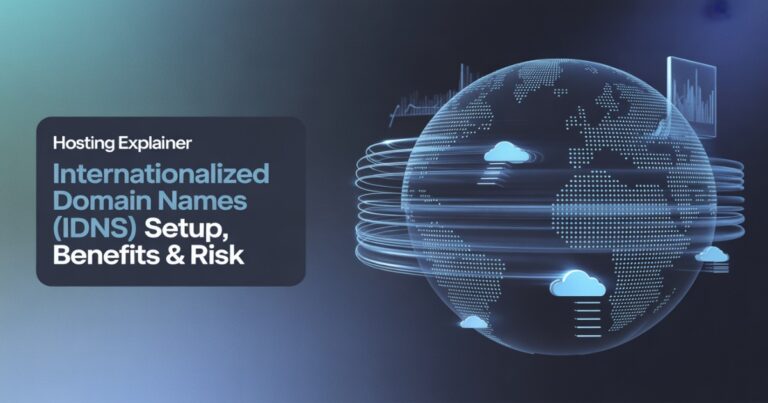Domain Extensions Explained: .com vs. .net vs. .io vs. .xyz
When I first tried to register a website, I thought the hardest part would be coming up with a catchy name. I was wrong. The real challenge came when I had to choose the right domain extension. Should I pick the classic .com, settle for .net, or go with one of the newer options like .io or .xyz?
If you’ve ever felt stuck on this decision, you’re not alone. The good news is that once you understand what domain extensions mean and how people see them, the choice becomes much easier.
In this guide, I’ll explain the differences between these popular extensions, share insights from personal experience, and give you practical tips on choosing the right one.
What Are Domain Extensions (TLDs)?
A domain extension is the part of a web address that comes after the dot. Think of .com, .net, .io, and .xyz.
These are called top-level domains (TLDs), and they fall into three main categories:
- gTLDs (generic TLDs): extensions open to everyone, like .com, .net, and .xyz.
- ccTLDs (country code TLDs): tied to countries, like .us for the United States or .de for Germany.
- New gTLDs: modern options like .blog, .shop, or .tech, which give you more branding flexibility.
Over time, .com became the universal go-to, while .net carved out space for tech businesses. In recent years, newer domains like .io and .xyz have become trendy among startups and creative projects.

Why Domain Extensions Matter for Your Website
At first glance, a domain extension seems like a small detail. But it plays a big role in how people trust, click, and remember your site.
- Branding: A .com looks professional and timeless. An .xyz feels modern and edgy.
- Trust factor: Users are more likely to click on domains that feel familiar.
- SEO impact: Google has said domain extensions don’t directly affect rankings. But higher trust and better click-through rates can improve your results indirectly.
- User experience: If your site is meant for a U.S. audience, a .us might work. If you’re going global, .com or .io might feel more universal.
Think of it this way: your domain extension sets the tone before someone even visits your site.
.com Domain: The Gold Standard
No surprise here: .com is the king of domain extensions. It was one of the first TLDs created, and it’s still the most recognized.
Pros of .com:
- Instantly trusted around the world.
- Easy to remember and type.
- Higher click-through rates compared to other extensions.
Cons of .com:
- Many names are already taken.
- Premium .coms can cost hundreds or thousands of dollars.
Best for: businesses, blogs, e-commerce, and general-purpose websites.
I once bought a short .com for a project even though it was more expensive, and it turned out to be worth every penny. People took the site more seriously, and it was easier to share.
.net Domain: The Traditional Alternative
Next up is .NET, which was originally created for networking companies and service providers. Over time, it became a fallback when .com wasn’t available.
Pros of .NET:
- Often available when the .com is taken.
- Seen as credible in tech and infrastructure industries.
Cons of .NET:
- Doesn’t have the same recall power as .com.
- Sometimes viewed as a backup choice.
Best for: tech companies, web services, and online tools.
If you’re in tech, .NET can work well. But if your audience is broader, people might still expect to see a .com.
.io Domain: The Startup Favorite
In the past few years, .io became the darling of startups and SaaS products. Although it’s a country-code TLD for the British Indian Ocean Territory, most people now treat it like a global extension.
Pros of .io:
- Short, sleek, and modern.
- Widely associated with tech and innovation.
- Many short names are still available compared to .com.
Cons of .io:
- More expensive than .com or .net.
- Less familiar to people outside the tech world.
Best for: startups, SaaS apps, and developer-focused platforms.
Take a look at successful companies like OpenSea (opensea.io) and Segment (segment.io). Their use of .io helped position them as cutting-edge.
.xyz Domain: The Bold and Modern Choice
The .xyz domain got a big boost when Google’s parent company, Alphabet, launched abc.xyz. Since then, it has become popular with creative brands and personal projects.
Pros of .xyz:
- Affordable, often cheaper than .com.
- Flexible and open-ended, works for anything.
- Stands out as modern and unconventional.
Cons of .xyz:
- Past reputation issues with spammy sites.
- Not always seen as “professional” for traditional businesses.
Best for: creative projects, personal sites, and experimental brands.
Artists, designers, and even blockchain projects often use .xyz because it gives them room to be different.
.com vs .net vs .io vs .xyz: Key Differences at a Glance
When you’re choosing a domain extension, it helps to see the differences side by side. Each one comes with its own strengths, drawbacks, and level of trust.
Below is a quick comparison of .com, .net, .io, and .xyz to make things easier. This snapshot gives you a clear idea of where each extension fits best.
| Extension | Best For | Pros | Cons | Trust Level |
|---|---|---|---|---|
| .com | General use, businesses | Trusted, easy recall | Expensive, often taken | High |
| .net | Tech, infrastructure | Available, credible | Feels like second choice | Medium |
| .io | Startups, SaaS | Trendy, techy | Higher price, niche familiarity | Medium-High (tech) |
| .xyz | Creative projects | Cheap, bold, flexible | Lower trust, spam history | Low-Medium |
As you can see, no single extension is perfect for everyone. The right choice depends on your goals, audience, and budget.
Use this comparison as a guide, then match it with the bigger picture of your brand. Once you know what matters most, picking the right domain extension becomes much simpler.
Beyond .com, .net, .io, and .xyz: Other Extensions You’ll See
While these four are the most talked about, the domain space is much bigger. Today, you’ll find extensions like:
- .org – popular with nonprofits and communities
- .co – used by startups as an alternative to .com
- .ai – gaining traction with artificial intelligence companies
- .shop and .store – ideal for e-commerce
- .blog – personal or professional blogs
It’s worth exploring these if your first choice isn’t available. Just remember: the newer or more unusual the extension, the more effort you may need to build trust.
How to Choose the Right Domain Extension for Your Website
So, which should you pick? Here’s a step-by-step approach:
- Start with .com if it’s available and affordable.
- Go with .net if you’re in tech or web services and the .com is taken.
- Choose .io if you’re targeting developers, startups, or SaaS.
- Pick .xyz if you want something creative, bold, and modern.
Ask yourself:
- Who is my audience? Do they expect a traditional or modern extension?
- What’s my budget? Can I afford a premium .com?
- How important is memorability for my brand?
Examples:
- A local bakery → .com (or a ccTLD like .us)
- A cloud hosting platform → .net or .io
- A personal design portfolio → .xyz or .com if available
FAQs About Domain Extensions
1. Does domain extension affect SEO?
No, Google doesn’t rank .com higher than .net or .xyz. What matters is your content and backlinks.
2. Is .com better than .net for ranking?
Not for ranking, but yes for user trust and click-through rates. People click .com more often.
3. Why are .io domains so expensive?
Because they’re in high demand among startups and tech brands. Limited supply drives prices up.
4. Are .xyz domains trustworthy?
They had a bad rep due to spam, but the perception is improving. Many real companies use .xyz today.
5. Which domain extension should I use for a new business?
Start with .com if you can. If it’s not available, pick an extension that fits your audience and industry.
6. Are new extensions like .ai or .shop worth it?
Yes, if they clearly match your niche. For example, .ai works great for AI companies, while .shop is perfect for e-commerce.
Which Domain Extension Should You Choose?
Choosing a domain extension may feel like a small detail, but it has a big impact on how people view your brand.
To recap:
- .com is safe and trusted.
- .net works for tech and online services.
- .io signals innovation and startups.
- .xyz is bold, affordable, and creative.
Personally, I always check for a .com first. But if I’m launching a tech project, I don’t mind using .io. For something more experimental, .xyz can be a great fit.
At the end of the day, your domain should match your vision and audience. The extension is just one piece; what really matters is the value your website delivers.






